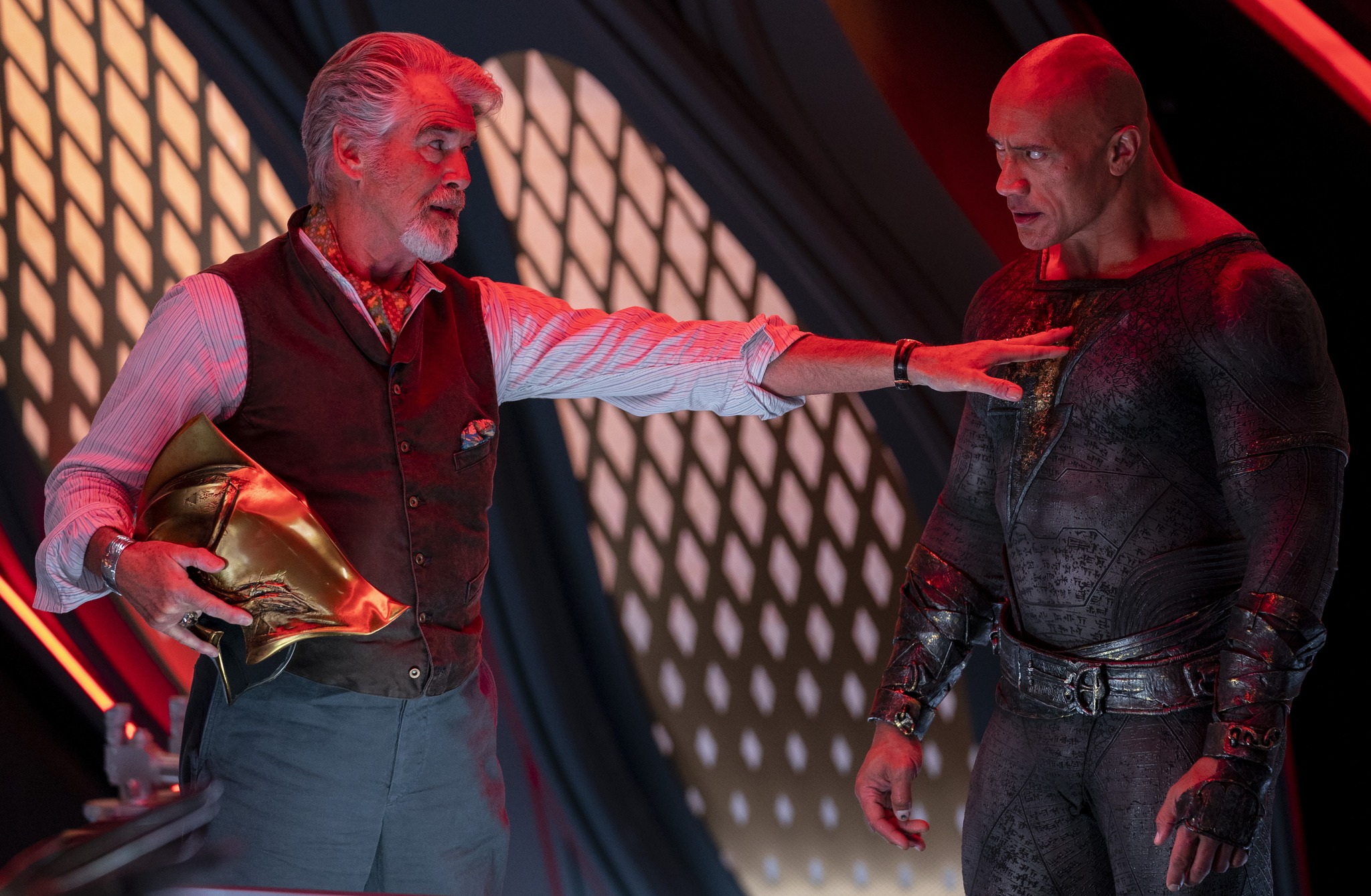
Film Critic Tom Green reviews DC’s Black Adam, finding that it is entirely forgettable
Black Adam (2022) is the most recent offering fresh from the superhero blockbuster assembly line. However, the conveyor belt now appears to be spinning out of control, sending vital components like plot, character development, and competent dialogue careering off into waste barrels. Black Adam is cobbled together with parts from the scrap pile, in hope that audiences will only care to notice the shiny new sticker haphazardly slapped on the rusting bumper which reads: ‘The Rock’.
This is the 10th directorial effort from Jaume Collet-Serra, who is most notable for his numerous Liam Neeson action flicks like The Commuter (2018) and Non-Stop (2014). This time, we are plunged into CGI rendered Kahndaq, a nondescript fictional Middle Eastern state overrun by the ‘international mercenaries’ of Intergang. Adraianna Tomaz (Sarah Shahi), awakens Teth-Adam (Dwayne Johnson) from an ancient slumber while searching for the Crown of Sabbac which is alleged to have mysterious powers. Adam’s subsequent path of destruction catches the attention of various international bodies and superhero groups including the Justice Society, who endeavour to put an end to his warpath.
Everything down to Adam’s suit looks like it has gone through a thousand stages of post-production
The setting initially provides intrigue, and to Black Adam’s credit, at least the audience do not have to endure yet another destruction of New York, which appears in the superhero genre to have been already levelled and rebuilt dozens of times. This, however, is little consolation given its brazenly plastic CGI affect; Kahndaq is just another iteration of Hollywood’s stereotypical unstable non-Western state, filled with eyebrow-raising and distasteful tropes. There is scarce effort to be found in any of the presentational aspects of Black Adam, everything down to Adam’s suit looks like it has gone through a thousand stages of post-production. The film plays as a series of uninspired, dull fight scenes punctuated by obligatory exposition through lifeless character conversations.
While Marvel slowly introduced trademark characters with their own solo movies in preparation for ensemble efforts like The Avengers (2012) and its subsequent sequels, DC are trying to make up for lost time by throwing their whole catalogue in at once. The introduction of the Justice Society inspired no discernible excitement, not least because of their egregious writing, but also because Warner Bros. were naively wagering on at least some audience recognition.
Some performances were serviceable, namely Pierce Brosnan as Dr. Fate, but the rest ranged from poor to offensive. Dwayne Johnson’s Adam is stoic and muted, which may have worked for someone with greater acting chops, but every close-up shot of Adam’s face only serves as a reminder of The Rock’s ubiquity in cinema (and his likely astronomical paycheque from Warner Bros.). Noah Centineo was also particularly nauseating as Atom Smasher, who aims for charmingly inept but lands on eye-rolling and tedious. At one point, his unintended destruction of an ancient cultural artefact is played for laughs, perhaps with the intention of highlighting the absurdity Western white saviorism, but it mostly smacks of the ironic self-consciousness that’s present throughout the rest of the film.
Black Adam is simultaneously paying lip-service to genuine anti-colonial struggle, whilst promoting hackneyed stereotypes of the Middle East
Black Adam may attempt to shield itself in meta self-awareness (at one point even mentioning the ‘superhero industrial complex’) but proceeds in indulging all of the genre’s worst excesses: painfully unfunny quipping, CGI eyesore set-pieces, and purposeless ‘easter eggs’ referencing greater films. Perhaps the worst moment in Black Adam involves a shameless ‘parody’ of Sergio Leone’s The Good, The Bad, and The Ugly (1966), ripping every element down to the score from the original screenplay.
Its ostensible anti-neocolonialism angle is extremely poorly handled, especially given the plot trajectory in the third act. The politics here is all surface, there is no comprehensive social message which would be fine if it weren’t aiming to deliver one. The impression given instead is that Black Adam is simultaneously paying lip-service to genuine anti-colonial struggle, whilst promoting hackneyed stereotypes of the Middle East.
This is unfortunately the logical continuation of superhero movies, which are quickly becoming stagnant, overstimulating, and devoid of any new ideas. Most of DC’s efforts are puzzlingly sterile given the rich source material, and even Marvel in its slow decline can breathe more life into some of the more obscure characters in their canon. Black Adam is emblematic of DC’s continually joyless cinematic universe. They lack the same ambition which gave rise to the superhero genre with Nolan’s Batman trilogy and have resorted to copying Marvel’s safe but lucrative formula.
Verdict:
Black Adam is one of the driest, most forgettable superhero films to date. It is offensive to the eyes, mind-numbingly repetitive and absent of any artistry.
1/10
Black Adam is in cinemas now
For more recent cinematic releases, check out these reviews from Redbrick Film:

Comments